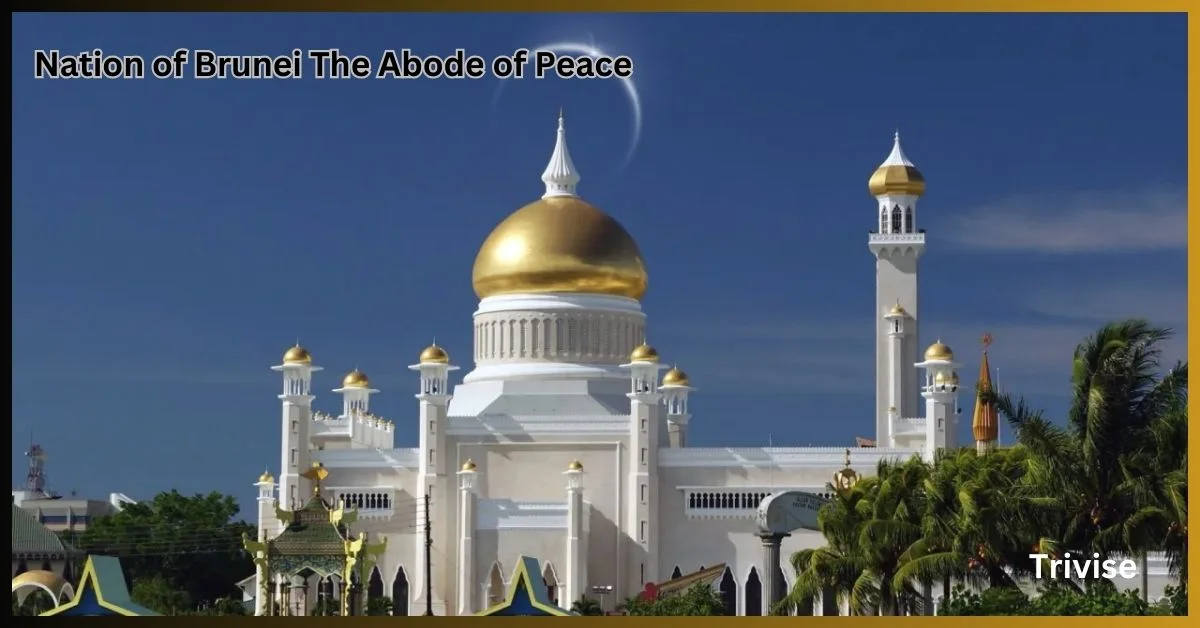The small yet intriguing nation of Brunei, officially known as the Nation of Brunei The Abode of Peace, is located on the island of Borneo in Southeast Asia. Known for its wealth, political stability, and unique culture, Brunei stands as a model of peace and tranquility in a region that has seen its fair share of political and economic turmoil. Despite its small size, Brunei has made a significant impact both regionally and globally, maintaining its sovereignty and identity amidst the diverse and changing tides of the modern world.
This article will delve into the key aspects of Nation of Brunei The Abode of Peace, including its religion, currency, historical background, and more. We will also explore its population by religion, the evolution of Brunei’s religion before Islam, and answer important questions like “Is Brunei a Muslim country?” and “Is Brunei a country?”.
The Nation of Brunei: An Overview
Nation of Brunei The Abode of Peace is a sovereign state located on the northern coast of the island of Borneo in Southeast Asia. It shares borders with the Malaysian state of Sarawak and is surrounded by the South China Sea. Despite its small size—approximately 5,765 square kilometers—it is known for its immense wealth, largely derived from its oil and gas reserves.
Brunei’s official name, “The Nation of Brunei the Abode of Peace,” reflects its commitment to peace, stability, and harmony. The nation has remained largely unaffected by the regional conflicts that have troubled its neighbors, and it boasts one of the highest standards of living in the world. The country is an absolute monarchy, ruled by Sultan Hassanal Bolkiah, who has been in power since 1967.
The Political Structure
Nation of Brunei The Abode of Peace is an absolute monarchy, meaning the Sultan holds full executive authority. The Sultan’s role is both ceremonial and political, and he is the head of state, head of government, and the country’s religious leader. Nation of Brunei The Abode of Peace has a system of government that combines traditional monarchy with a limited form of democracy, where the Sultan makes key decisions but also consults with a council of ministers. This system allows Brunei to maintain its historical and cultural identity while adapting to the needs of its citizens.
Brunei’s Wealth and Economy
Nation of Brunei The Abode of Peace is one of the richest countries in the world, largely due to its abundant oil and natural gas resources. The country has utilized its wealth to provide generous social benefits for its citizens, including free healthcare, education, and a high standard of living. Brunei’s currency is the Brunei dollar (BND), which is pegged to the Singapore dollar, further solidifying the nation’s strong economic position.
The Religion of Brunei
Religion plays a crucial role in the identity of Nation of Brunei The Abode of Peace and is deeply embedded in its culture and laws. The country is officially known as a Muslim state, with Islam being the state religion.
Brunei Religion Today: Islam as the State Religion
Islam has been the dominant religion in Brunei since the 15th century, but the nation has a rich history of religious evolution that is tied to its geographical and cultural history. Today, Nation of Brunei The Abode of Peace is an Islamic state with strong Islamic laws that shape the country’s legal framework and daily life.
- Sharia Law: In addition to civil law, Nation of Brunei The Abode of Peace has implemented Sharia law, which applies to Muslim citizens and governs family matters such as marriage, inheritance, and divorce. This reflects the nation’s commitment to maintaining its Islamic identity.
- Religious Observances: Islam influences many aspects of life in Nation of Brunei The Abode of Peace, including public holidays, daily practices, and education. The Sultan is regarded as both the spiritual and temporal leader of the country, a role that ties religious and political authority together.
Brunei Religion Before Islam
Before the arrival of Islam, Brunei’s religion was influenced by Hinduism, Buddhism, and animistic traditions. The earliest records suggest that Brunei’s rulers embraced animism and indigenous belief systems before adopting Indian religions in the 13th century.
- Hinduism and Buddhism: Indian traders and missionaries introduced Hinduism and Buddhism to the region, and Brunei’s early rulers likely practiced elements of these religions. Evidence of this influence can be seen in the names of early Brunei kings and in the remnants of religious sites, such as Hindu-Buddhist temples, in the area.
- Transition to Islam: By the 15th century, Islam began to take hold in Nation of Brunei The Abode of Peace. It is believed that Islam was introduced by Muslim traders and missionaries from the Arabian Peninsula. Sultan Muhammad Shah, Brunei’s first Muslim Sultan, officially adopted Islam as the state religion around the mid-15th century, marking the start of Brunei’s Islamic identity.
Brunei’s Population by Religion
The religious makeup of Nation of Brunei The Abode of Peace is predominantly Muslim, with small minority groups adhering to other religions. According to the latest census data, the breakdown of Brunei’s population by religion is as follows:
- Islam: Approximately 78% of Brunei’s population practices Islam, making it the dominant religion.
- Buddhism: Around 8% of the population adheres to Buddhism, which is the second most practiced religion in the country.
- Christianity: Christians, primarily Roman Catholics and Protestants, make up about 7% of the population.
- Indigenous Beliefs: The remaining 7% of the population practices indigenous faiths, with animism and other traditional belief systems being followed by a small minority, particularly among the indigenous communities.
Despite the dominance of Islam, Brunei is known for its religious tolerance. While Islamic principles govern the country, the practice of other religions is allowed and respected. Non-Muslim communities have places of worship, and religious festivals are recognized and celebrated.
Is Brunei a Muslim Country?
Yes, Brunei is a Muslim country. Islam is the state religion, and the Sultan is regarded as the spiritual leader. The country follows a strict interpretation of Sharia law, especially when it comes to personal matters such as marriage, inheritance, and family law. The implementation of Islamic principles permeates many aspects of Brunei’s legal system, education, and cultural practices.
Role of the Sultan in Religion
The Sultan of Brunei holds a unique position as both the head of state and the highest religious authority. His authority extends to both civil and religious matters, meaning he plays a central role in maintaining the nation’s Islamic identity. The Sultan has emphasized the importance of Islam in Brunei’s governance and has enacted policies that ensure the country remains rooted in Islamic values.
Brunei’s Currency: The Brunei Dollar (BND)
The official currency of Brunei is the Brunei dollar (BND), which is pegged to the Singapore dollar at par (1:1). This arrangement reflects the strong economic ties between Brunei and Singapore. The Brunei dollar is issued by the Monetary Authority of Brunei Darussalam and is widely used in the country. The economy of Brunei is driven primarily by oil exports, with petroleum and natural gas accounting for more than half of the country’s GDP.
Features of the Brunei Dollar
- Stable Currency: The Brunei dollar is known for its stability due to its peg to the Singapore dollar and the country’s strong economy.
- Coins and Banknotes: The currency comes in both coins and paper banknotes. Coins are available in denominations of 1, 5, 10, 20, and 50 cents, while banknotes come in denominations of 1, 5, 10, 50, and 100 dollars.
Is Brunei a Country?
Yes, Brunei is a country. Officially known as “The Nation of Brunei, the Abode of Peace,” it is a sovereign state located on the island of Borneo in Southeast Asia. Brunei is bordered by Malaysia and the South China Sea, making it a geographically strategic location in the region. Despite its small size, Brunei is one of the wealthiest nations globally due to its extensive oil and gas reserves.
Government and Sovereignty
Brunei is an absolute monarchy, which means the Sultan holds supreme power over the country. The Sultan, who is both the head of state and government, has ruled Brunei for over five decades. The country is independent, having gained full sovereignty from the United Kingdom in 1984.
Brunei People and Culture
The people of Brunei are known for their hospitality, respect for tradition, and strong sense of national identity. The Brunei people are ethnically diverse, with the majority being Malay, but also including ethnic Chinese and indigenous groups. The national language is Malay, though English is widely spoken, particularly in business and government.
Key Aspects of Brunei’s Culture
- Respect for Islam: Islam is a fundamental aspect of Brunei’s culture, influencing social norms, public behavior, and national celebrations.
- Traditional Arts: Brunei has a rich cultural heritage, including traditional dances, music, and crafts. Sungkit, a traditional dance, and Wayang Kulit, a form of shadow puppetry, are examples of the country’s cultural richness.
- Food: Brunei’s cuisine reflects the country’s ethnic diversity, with Malay, Chinese, and indigenous influences. Popular dishes include nasi lemak, soto, and satay.
Conclusion
Brunei, known as the Nation of Brunei, the Abode of Peace, is a small yet significant country with a rich history, vibrant culture, and deep Islamic roots. The nation’s wealth, political stability, and commitment to peace make it a standout example of prosperity in Southeast Asia. Brunei’s unique combination of historical influences, such as its pre-Islamic traditions and its eventual adoption of Islam, has shaped the country’s modern identity.
As a sovereign state, Brunei continues to uphold its values of peace, prosperity, and Islamic law, providing a glimpse into a way of life that blends tradition with modernity.
FAQs
- What is the capital of Brunei? The capital of Brunei is Bandar Seri Begawan, which is also the largest city in the country.
- What is the official language of Brunei? The official language of Brunei is Malay, although English is also widely spoken.
- Is Brunei a democracy? No, Brunei is an absolute monarchy. The Sultan holds all political power in the country.
- What is the population of Brunei? Brunei’s population is approximately 450,000 people, with a high standard of living due to the country’s wealth.
- Does Brunei allow religious freedom? While Islam is the state religion, Brunei is generally tolerant of other religions. Non-Muslim communities are allowed to practice their faith.
- What is Brunei’s currency? The currency of Brunei is the Brunei Dollar (BND), which is pegged to the Singapore Dollar at par.









